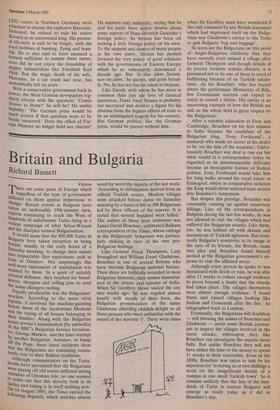Britain and Bulgaria
Richard Bassett
1here are some parts of Europe which . regardless of the type of government inflicted on them appear impervious to change. Recent events in Bulgaria have taken an undeniably 19th-century turn, reports continuing to reach the West of hundreds of unfortunate Turks dying in a violent campaign of what Seton-Watson and his disciples termed Bulgarisation. It would seem that the 800,000 Turks in Bulgaria have taken exception to being forced, usually in the early hours of a Saturday morning, to change their names into respectable Slav equivalents such as Ivan or Dmitrov. Not surprisingly this Well-worn instrument of assimilation was resisted by them. In a spirit of suitably oriental defiance, they reached for bread- knives, shotguns and rolling pins to send the name-changers reeling. Equally predictable was the Bulgarians' reaction. According to the more vivid reports, it involved the machine-gunning before dawn of the recalcitrant Moslems and the razing of all houses belonging to their families. Along with the Bulgarian secret service's assassination (by umbrella) of the BBC's Bulgarian Service broadcas- ter, George Markov, and the later attempt bY another Bulgarian, Antonov, to bump off the Pope, these latest incidents show that the Bulgarians are remaining consis- tently true to their Balkan traditions. Although commentators on the Turks' deaths have speculated that the Bulgarians were paying off old scores inflicted during centuries of Ottoman rule, no one seemed to point out that this atrocity both in its tactics and timing is in itself nothing new. On 14 August 1895, the Times carried the following dispatch, which matches almost word for word the reports of the last week: 'According to information derived from an official Turkish source, Moslem villages were attacked before dawn on Saturday morning by a band of 400 to 500 Bulgarians led by three officers of the reserve. It is stated that several hundred were killed.' The author of these terse sentences was James David Bouchier, celebrated Balkans correspondent of the Times, whose outrage at the Bulgarians' behaviour was particu- larly striking in view of his own pro- Bulgarian feelings.
Like General Frank Thompson, Lady Strangford and William Ewart Gladstone, Bouchier is one of several Britons who have become Bulgarian national heroes. Their dates are faithfully recorded in most Bulgarian histories, their names immortal- ised in the streets and squares of Sofia. When Sir Geoffrey Howe visited the city two weeks ago, he was regaled almost hourly with details of their lives, the Bulgarian pronunciation of the name Gladstone affording childish delight to all those present who were unfamiliar with the sound of the slavonic 'I'. There were times when Sir Geoffrey must have wondered if the only comment by any British statesman which had impressed itself on the Bulga- rians was Gladstone's advice to the Turks to quit Bulgaria tag and baggage'.
So keen are the Bulgarians on this proof of Anglo-Bulgarian solidarity that they have recently even named a village after General Thompson and though details of its precise location remain obscure, it is presumed not to be one of those in need of bulldozing because of its Turkish inhabi- tants. As for Bouchier, who lies buried above the picturesque Monastery of Rila, few Communist martyrs can expect to enjoy as sacred a shrine. His career is an interesting example of how the British are still on the whole held in great respect by the Bulgarians.
After a suitable education at Eton and Cambridge, Bouchier on his first mission to Sofia became the confidant of the Bulgarian king, 'Foxy Ferdinand', a monarch who made no secret of his desire to be 'on the side of the assassins'. Unfor- tunately Bouchier was deaf in one ear but what would in a correspondent today be regarded as an insurmountable difficulty became an inescapable feature of Balkan politics. Foxy Ferdinand would take him for long walks around his royal estate at Exinograd, where in comparative isolation the King would shout selected state secrets into Bouchier's tympanum.
But despite this prestige, Bouchier was constantly running up against unsavoury killings. Like all the correspondents in Bulgaria during the last few weeks, he was not allowed to visit the villages which had suffered the Bulgarian attacks. Like them, too, he was fobbed off with denials and accusations of Turkish agitation. But even- tually Bulgaria's sensitivity to its image in the eyes of its friends, the British, came into play and Bouchier found himself invited at the Bulgarian government's ex- pense to visit the affected areas.
Although every person he spoke to was threatened with death or ruin, he was able after 11 weeks to collect enough evidence to prove beyond a doubt that the attacks had taken place. The villages themselves were almost enough evidence. 'I found burnt and ruined villages looking like Sodom and Gomorrah after the fire,' he telegraphed back to London.
Eventually, the Bulgarians will doubtless — still intoning the names of Bouchier and Gladstone — invite some British journal- ists to inspect the villages involved in the latest attacks, whereupon they like Bouchier can investigate the reports more fully. But unlike Bouchier they will not have either the time or the money to spend 11 weeks in their researches. Even in the 1890s, Bouchier was taken to task by his superiors for 'lecturing us at two shillings a word on the insignificant details of a rumpus in one small Turkish town'. So it remains unlikely that the fate of the hun- dreds of Turks in eastern Bulgaria will emerge as easily today as it did in Bouchier's day.














































 Previous page
Previous page